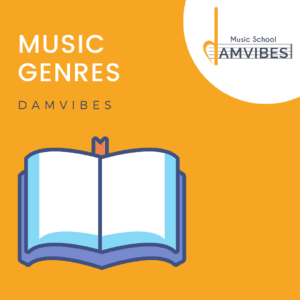Introduction to Music Genres:
Pop music genre
Definition of pop music
Pop music (from the English pop music, a contraction of popular music), also known simply as pop, is a genre of popular music that originated in the late 1950s as a derivation of traditional pop, in combination with other musical genres. that were fashionable at that time
Hip hop music genre
Definition of hip hop music
Dance music style born in the United States of America in the 1970s as a derivative of funk and characterized by its electronic base and for being associated with alternative manifestations such as break dance or graffiti. It uses a technique named “Rapping” which is poetry spoken rhythmically
Rock music genre
Definition of rock music
Firstly, Rock music is a style born in the 1960s as a derivative of rock and roll and characterized by the use of complex melodies and rhythms, with fairly fixed instrumentation (basically electric guitar, electric bass, keyboard and drums) and with an energetic rhythm underlined by the power of the bass and the drums, all of which is often linked to an anti-authoritarian and provocative attitude; it has developed a multitude of variants and has given way to new styles, such as pop, punk or heavy.
Rhythm and blues music genre
Definition of rhythm and blues music
Musical style born in the 1940s as a derivative of blues and related to jazz, soul and gospel; It is characterized by being a mainly vocal genre, typical of solo singers or grouped in quartets or quintets that accompany their voice with the interventions of a choir.
Soul music genre
Definition of soul music
Soul is a term adopted to describe African-American music in the United States as it evolved between the 1950s and 1970s. )
Reggae music genre
Definition of reggae music
Musical style of Jamaican origin derived from rock whose songs are characterized by a happy, repetitive and marked rhythm, soft melodies and committed lyrics in favor of peace, aid to the Third World, etc.
Country music genre
Definition of Country music
Country (also called country & western, country music or country music) is a musical genre that emerged in the 1920s in the rural regions of the South of the United States and in the Maritimes of Canada and Australia. In its origins, it combined the folk music of some European immigrant countries, mainly Ireland, with other musical forms, such as blues, bluegrass and spiritual and religious music, such as gospel.
Funk music genre
Definition of Funk music
Musical style born in the United States of America in the 1970s as black popular music derived from soul and with jazz influences, characterized by its strong, slow and very syncopated rhythm.
Folk music genre
Definition of folk music
Musical style born at the end of the 1950s in the United States of America and characterized by the combination of traditional music with the forms of rock, by the social content of its lyrics and by the simplicity of its composition.
Jazz music genre
Definition of jazz music
Jazz is an artistic-musical manifestation originating from communities in New Orleans, in the United States.[1] This manifestation would have appeared around the end of the 19th century in the region of New Orleans, having its origins in the popular culture and creativity of the black communities that lived there, one of its most important development spaces.
Disco music genre
Definition of disco music
Disco music (also known in English disco music or, in French, discothèque) is a dance music genre whose popularity peaked in the mid-1970s. Latin Americans and psychedelic music connoisseurs, as well as other communities in New York City and Philadelphia during the 1970s
Classical music genre
Definition of classical music
Classical music is an erudite musical genre, characterized by the complexity of instrumentation and by being represented in the form of symphony, opera or other types of musical developments.
Also known as “erudite music”, the beginnings of classical music can be traced back to the 9th century, based on Western Christian sacred music traditions. Its growth became more accentuated mainly during the Middle Ages (between the 16th and 18th centuries).
Electronic music genre
Definition of electronic music
Electronic music is music production made with various types of electronic devices. For example, synthesizers, digital recorders, software, computers and the like.
Blues music genre
Definition of blues music
We can define blues as a style or musical form that is based on the use of low (bass) notes for expressive purposes and that maintains a repetitive musical structure.
New age music genre
Definition of new age music
New Age music, also known as New Age music, is a musical genre that is characterized by a soft melody, using instrumental sounds (harp, keyboards, flute, guitar, organ), ethereal voices and sounds of nature.
Christian Music genre
Definition of Christian music
Gospel music (from English gospel; in Portuguese, “gospel”) is a type of music composed to express belief, individual or community, predominantly Christian.
Traditional Music genre
Definition of traditional music
Traditional music belongs to each of the countries with an important tradition of original music from that region
Ska music genre
Definition of ska music
Ska is a musical genre that originated in Jamaica in the late 1950s, combining Caribbean elements such as mento and calypso and American elements such as jazz, jump blues and rhythm and blues.
Indian classical music genre
Definition of Indian classical music
Classical music in India belongs to the region of India. It’s a complex song that uses special metrics and scales. It is said that other songs are derived from here such as el flamenco
Metal music genre
Definition of heavy metal music
Heavy metal (or simply metal) is a rock genre that developed in the late 1960s and early 1970s, largely in the United Kingdom and the United States.
Brazilian music genre
Definition of Brazilian music
The music of Brazil encompasses several regional musical styles influenced by European, American, African and Amerindian forms. Brazilian music developed some unique and original styles such as forró, repente, coco de roda, axé, sertanejo, samba, bossa nova, MPB, nativist music, pagode, tropicália, choro, maracatu, embolada (sudden coconut), frevo, brega , Brazilian funk, modinha and Brazilian versions of foreign musical styles, such as rock, pop music, soul, hip-hop, disco music, country music, ambient, industrial and psychedelic music, rap, classical music, fado and gospel.
Flamenco music genre
Definition of flamenco music
Flamenco is a typically Spanish style of music and dance. This cultural manifestation is mainly related to the autonomous community of Andalusia, in the south of Spain, as well as to the city of Murcia and the region of Estremadura.
Salsa music genre
Definition of salsa music
Salsa is a mix of musical rhythms such as son montuno, mambo, cha-cha-chá and Cuban rumba. It also received influences from merengue (from the Dominican Republic), from Calypso (from Trinidad and Tobago), from Colombian cumbia, from North American rock and from Jamaican reggae.
Merengue music genre
Definition of merengue music
Merengue is a type of music and dance in which one foot marks the time and the other is dragged along the floor. It is very popular in several Latin countries such as Puerto Rico, Cuba, Panama, Mexico, Honduras, Guatemala, Ecuador, Sao Tome and Principe, Venezuela and is the Dominican national dance. It is also widely known in Angola as its origin is African and was taken by slaves from Southern Africa (Angola) to the new territories of the Americas. The most popular style of merengue is usually performed by a wide range of instruments that includes various saxophones, accordions, trumpets and keyboards, with fun vocalists. At the choreographic level, the merengue presents easy and fast steps, danced by intertwined couples.
Bachata music genre
Definition of bachata music
Bachata is a musical genre that originated in the Dominican Republic in the first half of the 20th century. It is a fusion of influences from southwestern Europe, mainly Spanish guitar music, with indigenous Taino and sub-Saharan African musical elements, representative of the cultural diversity of the Dominican population.











2 responses
Thank you a lot for lesson that you gave, I really learned and I’ll always come to revise when it’s necessary!
I think New Age music should be relabeled to Ambience.